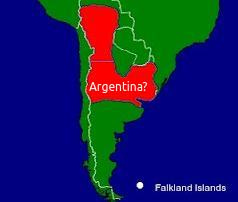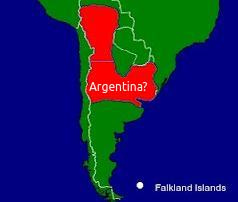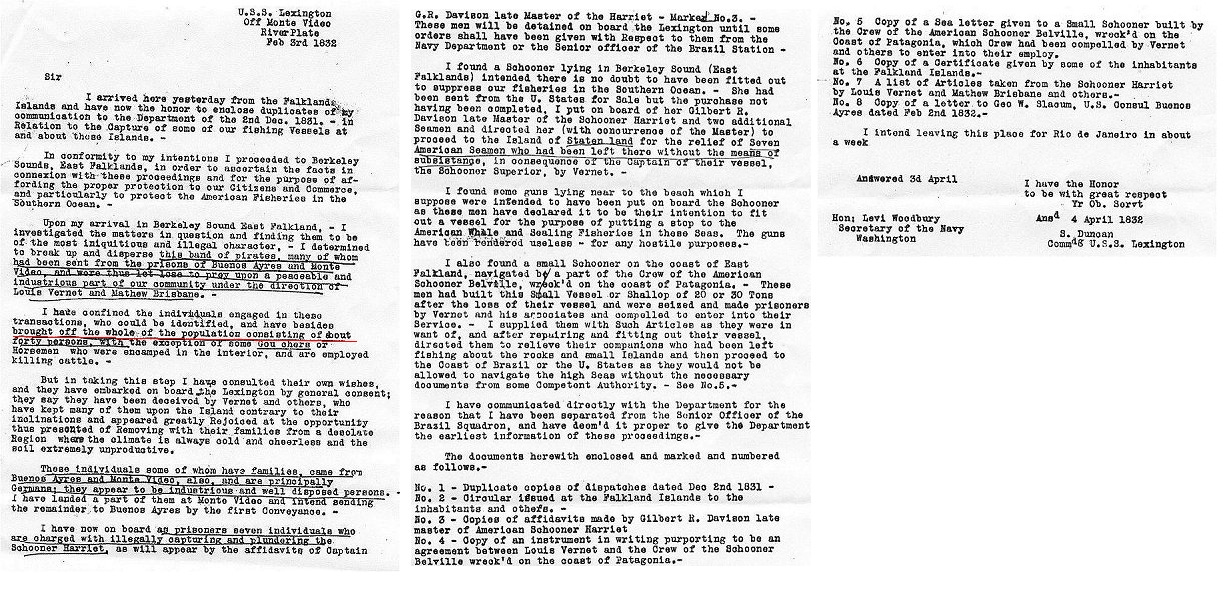The Falkland Islands are a group of islands in the South Atlantic Ocean. They are 300 miles east of Patagonia. Las Malvinas is the Spanish name for the Falkland Islands.
The Falkland Islands were unpopulated until 1764. The East of the islands were settled by the French in 1764 (East Falkland Island) and the west settled by the British in 1765 (West Falkland Island). The British claimed sovereignty over the entire island group. The Islands may well have first been discovered in 1421 by the Chinese. The Spanish purchased East Falkland Island from the French in 1766. In 1770 the Spanish attacked West Falkland, taking control of the entire group but in 1771 they withdrew under threat from the British, recognising the right of the British to remain in West Falkland in 1775. The Islands are 460km away from the South American mainland, well beyond any normal territorial limits of any country. The Argentine claim to the Islands originates in a brief occupation of East Falkland 200 years ago by the State of Buenos Aires which was one of the states that claimed to rule the United Provinces of South America during the Civil War of the 1820s/30s.
In 1823 the United Provinces of South America was a transient State consisting of Uruguay, much of Bolivia and a piece of northern Argentina. In the 1820s the United Provinces broke up into Bolivia, Uruguay and two sets of warring states, the Confederation of Argentina and the State of Buenos Aires, which claimed sovereignty over each other. An entrepreneur called Luis Vernet was proclaimed governor of the islands by the Buenos Aires (AKA Liga del Litoral, not the United Provinces or Argentine Confederation) in 1829. This was illegal because by then only Spain, Britain and, on the South American legal principle of uti possidetis juris, Chile and Uruguay had any justifiable claim to the Falkland Islands.
(United Provinces and Falkland Islands in 1830s)
Luis Vernet’s mission in the Falklands only lasted 2 years until it was ejected by the Americans.
"In 1831, Luis Vernet seized three American vessels (Breakwater, Superior and Harriet) hunting seals in Falklands waters, confiscating their catch and arresting their crews. Vernet returned to the mainland, bringing senior officers of the American vessels to stand trial for violating restrictions on seal hunting. The American consul protested violently against the seizure of American ships and the USS Lexington sailed to the Falklands. The log of the Lexington reports only the destruction of arms and a powder store, though in his claim against the US Government for compensation (rejected by the US Government of President Cleveland in 1885) Vernet stated that the settlement was destroyed.[4] The Islands were declared free from all government, the seven senior members of the settlement were arrested for piracy[5] and taken to Montevideo,[3] where they were released without charge on the orders of Commodore Rogers.[6]. The Lexington also removed the entire administration and most of the population of the Falklands [7].(Wikipedia)"
(Report of the Lexington saying that the islands had been rendered free of any administration and of nearly all the people. Click on image to see full size.)
In 1832 the Buenos Aires sent a military governor to the Islands to found a penal colony but the troops under his command mutinied. The British military arrived on 20 December 1832 and re-established British rule and imposed order. Vernet was invited to return to the Falklands but, as the United Provinces had disintegrated, was unable to do so. Argentina claims the Falkland Islands because the state of Buenos Aires was in control of the Islands from 1829 to 1831/32 and in the late 1850s the Argentines conquered the later Republic of Buenos Aires, which could have resumed the claim. The Argentine claim is a claim to "spoils of war" through conquering the Republic of Buenos Aires and then re-awakening all of that state’s historical claims, both legal and illegal.
In the early 1830s the Confederation of Argentina and the state of Buenos Aires were at war. This alone would undermine the claim of the modern Republic of Argentina over the Las Malvinas. To support the modern claim to the Falklands Argentine children are taught that the Confederation of Argentina was happy to let the State of Buenos Aires deal with foreign policy such as weapons shipments from abroad, territorial claims and foreign military alliances despite the war. This does not fool foreigners but having been taught the story as children Argentines do not question this absurd "myth of common foreign affairs". Argentines get confused by the Federal Pact of 1831 between the rebel states of the Liga del Litoral who called themselves the "real" Argentina rather than the Argentine Confederation of the League of the Interior.
So, except for a few months of dubiously legal occupation the East Falklands has not been Argentine. Indeed it is not even clear that Argentina ever occupied the islands because the nations of the 1830s do not align with those of 2020s. However, successive "Argentine" governments have claimed sovereignty over the whole Falkland Islands for almost two hundred years, with a gap between 1851 and WWII in which they recognised British rule. The West Falkland Islands have always been British.
.
The legality of the current Falkland Islands administration is discussed in depth at: The Legal Position of the Falkland Islands.
Although the Argentine claim to the Falkland Islands is null and void, the Mapuche have a strong claim to Patagonia (southern Argentina). Argentina launched a genocidal invasion of Patagonia in the late 1870s and the land is still Mapuche according to any independent assessment.





